
 Gloss-er-ary
Gloss-er-ary
To help Wulfbertie understand some of the things people said to him,
Brother Xerxes gave him a list of words and what they mean. It wasn't
very good so Wulfbertie added to it when he found that
people didn't understand his own words. The following may help
you read Wulfbertie's stories.
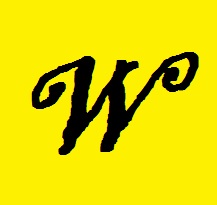 A
A
-
Abbey
-
A religious establishment occuplied by monks, and governed by an
Abbot. Or, one occupied by nuns, and governed
by an Abbess.
-
Abbot/Abbess
-
A wise and responsible Monk or Nun
in charge of an Abbey.
-
Not to be confused with a Bess - which might be a person called Elizabeth, or a Bot
which we don't know the meaning of, but might have something to do with the
Necessarium.
-
Abound
-
Bouncing about. Or bounding around.
-
Aeon
-
A very long time. Longer even than an aera, an aepoch or an aepsipode.
-
Aepsipode
- An event, chapter or part of a story. It is possible that Wulfbertie is mis-using
the word Episode.
-
A-gley
- Awry, amiss - wrong (a Scottish word). (With thanks to Robert Burns: "To a Mouse":
'The best laid schemes o' mice an' men Gang aft a-gley.').
-
Alderman
- A local official, similar to a mayor. Pronounced "Older-Man" because they often were.
-
Almonry
- A building where food and shelter was given to the Poor.
-
Ambush
- Jumping on someone unexpectedly after having skulked, slinked or hidden in the shadows.
- Am plant in am garden beside am tree.
-
Ancient
- Very, very old. Older even than grandparents and Elders.
Perhaps about as old as a fossil. Or perhaps as old as olden times when
things used to happen that were different than the way they happen now.
- Your four fathers probably lived in ancient times.
-
Anvil
- A large piece of iron used by the blacksmith in his Forge.
-
Arab
- An ancient people from the Middle East and north Africa, who spent
a lot of the Middle Ages coming up with numbrals
and inventing lots of complicated Mathematics.
- Many of them lived in the Arabian Peninsula, which is a Peninsula
which belongs to the Arabs.
-
Architecture
- Building stuff. Or the building when someone has built it. Or a bit of a building when it's
been built. Basically Architecture is posh building done by an Architect. Less posh building is done
by a Mason.
-
Assassination
- A carefully planned murder. Assassinations are done by assassins who assassinate assassinees
(or victims).
Top
 B
B
-
Baldrat
- There were many Saxon kings of Mercia during this period, none of them called
Baldrat. The chart of Baldrat's (And Wulfbertie's)
ancestors contains other kings who never existed.
-
Bandit
- A bad person who is assassinating people or robbing them.
Like a highwayman, raider or brigand. Kings and Sheriffs
try to stop their behaviour. In fact they have often banned it.
-
Bandy Ball
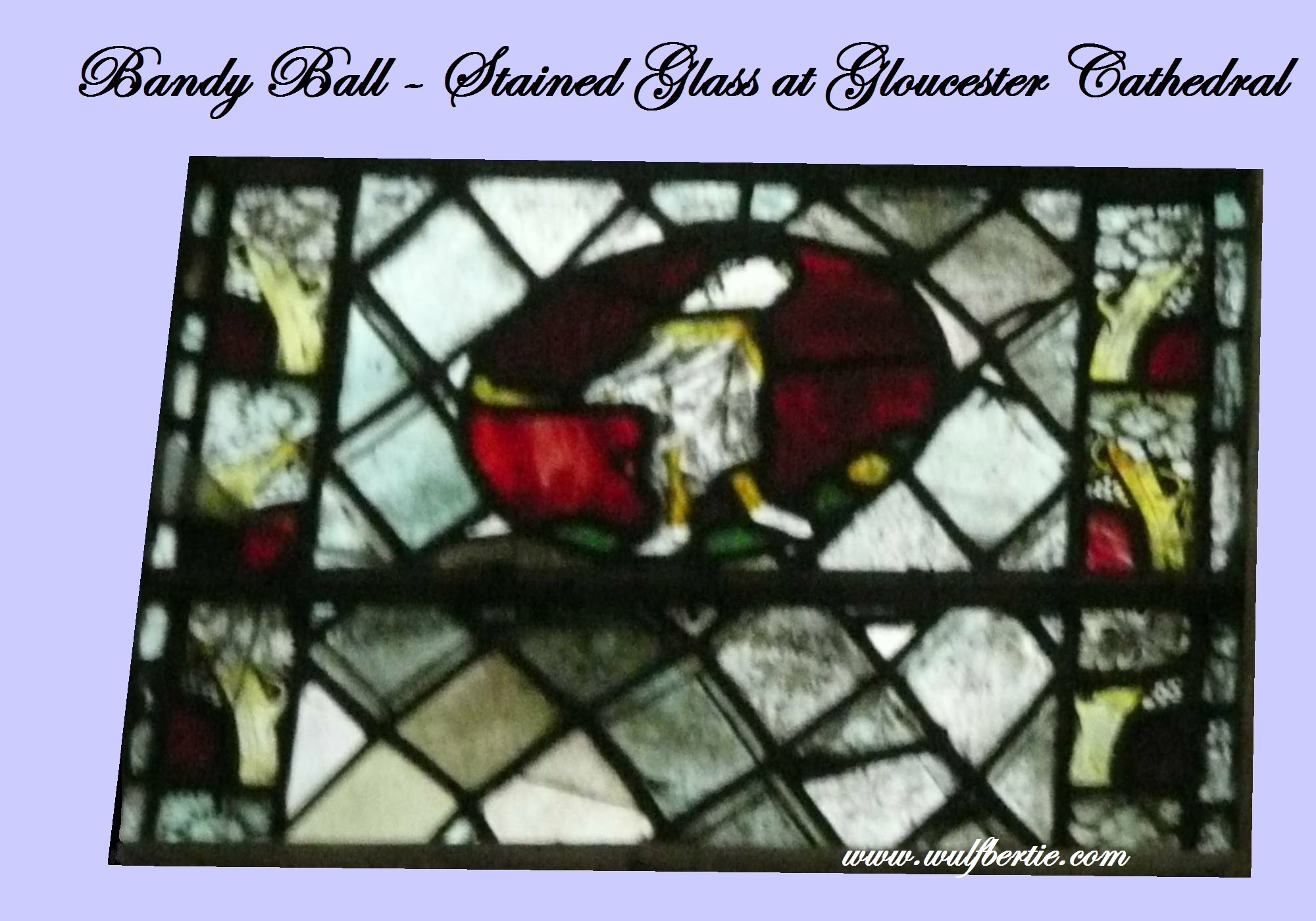
- A game in the Middle Ages. Any Middle Aged person can tell you the rules.
- 'Basolution
- Absolution - or Abba's solution. A ceremony in which you are forgiven your sins.
-
Bloody Flux
- Diarrhoea, with blood in the poo.Fatal in Wulfbertie's time.
-
Bodyguard
- A guard who stays close to somebody's body. A bodyguard might be a henchman
or a sidekick.
-
Boon
- A benefit. A gift. An offer from someone powerful to do something for you.
-
Breeches
- Short trousers fastened below the knee.
-
Brewery
- Beer was brewed because water was unsafe to drink. Oddly, these days it is the other way round.
-
Brother
- A monk.
- Someone for keeps.
-
Burlap
- A coarse and scratchy fabric. Nothing to do with burping.
Top
 C
C
-
Caledonia
- An old name for Scotland when the Caledonians lived there. This was before
the Picts who wore woad and the Scots who came from Ireland which
used to be called Hibernia. People sometimes write
songs about it all.
-
Canonize
- To appoint someone as a Saint. It generally requires a couple of miracles.
- Nothing to do with Cannons - which are big devices for flinging objects. More
explosive than catapults and much bigger than
slings.
- Wulfbertie didn't know anything about Cannons, although he would have liked to.
- Cannons definitely have nothing to do with cats. As far
as we are aware, no cats have been canonized.
-
Casket
- A little cask.
- A valuable box, or a box for keeping valuables.
-
Cat
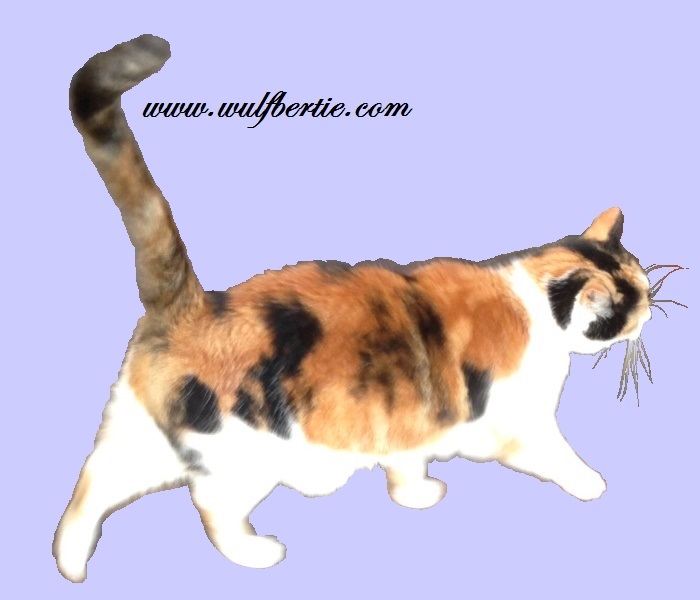
Felis Catus
: a puss (not to be confused with pus or Pustules) or, when
younger, a kitty. They tend to object to being thrown through the air by catapults.
Nonetheless - well known for landing on their feet when falling from great heights.
- Cats are as liquid as their shadows and offer no angles to the wind.
-
Catapult
- A device for flinging objects. Like a big sling.
- Nothing to do with cats.
-
Caustic Soda
- A harsh chemical that removes ink.
-
Ceremony
- A big formal party where everyone is very serious and does some ritual. Often an event to celebrate
something or congratulate someone. Or possibly to consecrate something or someone.
-
Cesspit
- A place for the nastiest, pooiest waste.
-
Chamberlain
- Manager of the household including clothing and bathing arrangements.
-
Chapter House
- A room where the monks met to discuss
business and read a chapter from the Rule.
-
Charybdis
- A sea monster who swam in a circle so fast that she created a whirlpool
which sucked ships down to the bottom of the sea. Ships trying to steer clear
of her sometimes came too close to the cliffs where her sister, Scylla, lived.
Scylla was also a monster. She would reach down from the cliffs and eat the sailors.
-
Clog
- A type of shoe made entirely of wood. Despite being made of wood they can
be surprisingly comfortable. But only if they are the right size.
- A blockage or obstruction in a pipe or a confined space. This would probably happen if
you put a clog down the toilet (or the Necessarium). But if you
put a clog into the cogs of a machine it is called sabotage for a complicated reason.
-
Cloister
- A covered walk backing onto buildings and surrounding a square garden called
a Garth.
-
Colonia
- A high status Roman town. The sort of place which looks down upon mere
Urbs and Oppida.
-
Consecrate
- Make a formal dedication of some object or person for a religious purpose.
-
Convent
- A place where a religious community of nuns lived.
Like a Monastery for nuns.
- Somewhere convenient in which to be content.
-
Converge
- Come together from lots of distant or different places which are often in totally
different directions.
-
Coracle
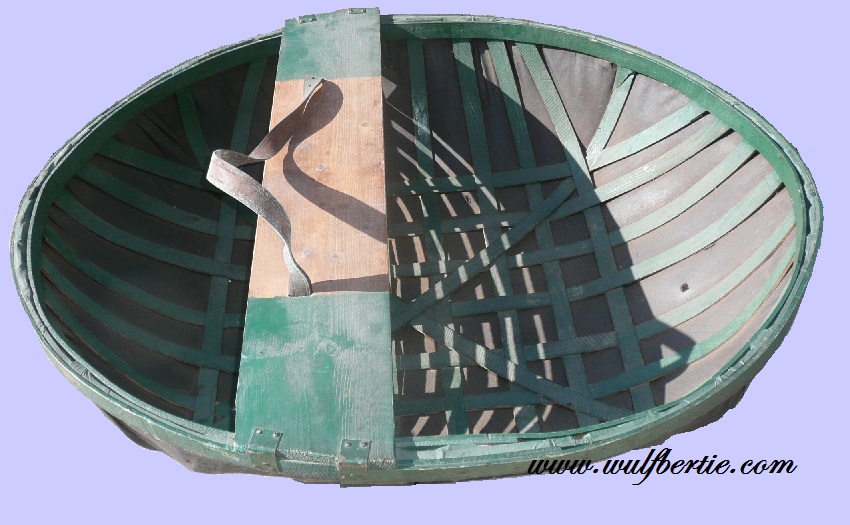
- A round frame covered with hides and used as a boat. Very hard to steer without
going round in circles (like many things in life).
-
Cowl
- Large loose hood of a monk's habit.
- A good place to hide your scowl.
-
Cow Parsley
- A tall unappetising plant, also known as Queen Anne's lace - but not until the
time of Queen Anne - which was a long time after Wulfbertie learnt the kings and
queens of England.
-
Croquet
- An excellent game played with a big mallet and some small wooden
cannon-balls.
- Snooker was indirectly based upon it and it is played at the All England Club
in Wimbledon (they also play lawn tennis there sometimes).
-
Crypt
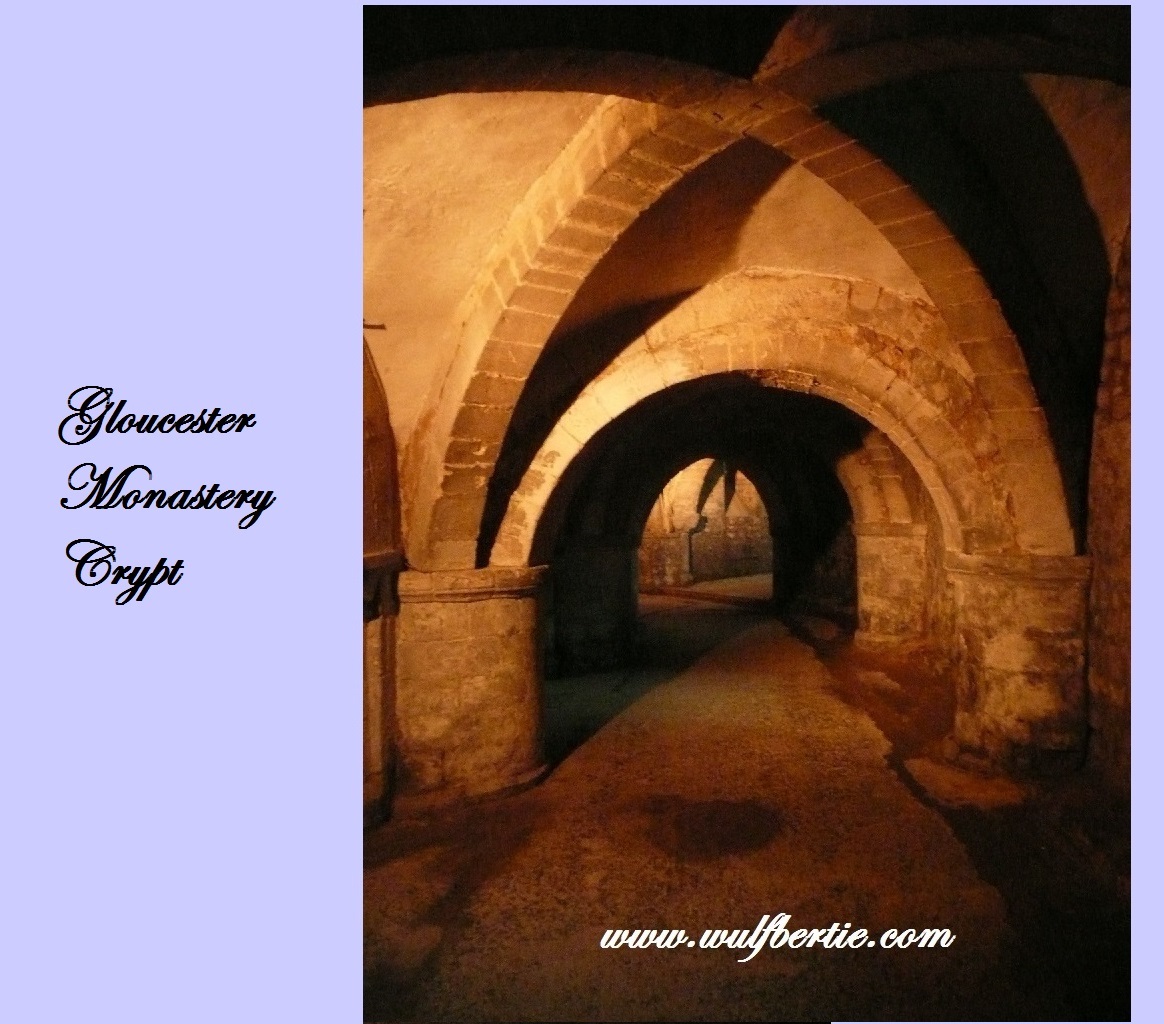
- Underground chamber of a church.
- Sometimes cryptic things happen, but they are kept secret.
Top
 D
D
-
Deeds
- Very serious documents indeed. They prove the ownership of property and important obligations.
- The Bold Deeds to Inspire in the Wulf Man Mantra are a
different sort of deed. Those are deeds which you do. So that when you have done them you have
done the deed.
- If the deed you have done is dastardly then you have done the dastardly deed.
Which is naughty of you.
- Bold Deeds to Inspire are not dastardly. They are bold and inspiring.
-
Delicacy
- Being carefully polite.
- A rare, delightful and lovely thing to eat.
-
Destiny
- What is going to happen to you - definitely. The unswerving future. Fate but not
necessarily Fatal.
-
Dole House
- A place to hand out bread, pottage
and ale to the poor.
-
Dragon
- A frightening winged lizard which could breathe fire and had four legs. Like
a Wyvern. Often used as a celtic symbol by Welsh
princes (Tywysog). A red dragon is still the symbol
of Wales.
-
Dragon Fruit
- A type of fruit grown in Latin America or China which looks a
bit like a Dragon's egg.
- The inside is squishy and delicious and looks a bit like frogspawn. Sometimes it is red
and sometimes it is white because there are two types of dragon: red ones and white ones. Welsh
Dragons are red.
-
Druid
- Celtic priests (priests are like Monks).
Lots used to live on Anglesey which is an island called Ynys Mon or Mona.
- Merlin was a druid who helped King Arthur.
-
Dyke
- A built-up bank of earth, mud, stones and rubble along the side of a river (or
a canal, which is a man-made river).
- Dykes were built to stop the river flooding. But this only worked if they were regularly
repaired.
Top
 E
E
-
Elder
- A person who is older than someone else.
- A particular type of older person (not necessarily an Alderman)
who is appointed to lead a tribe or village because of their age, experience and wisdom.
- A type of tree which is sometimes supposed to have something to do with witches.
-
El Dorado
- A secret lost city made entirely of gold!
-
Elvers
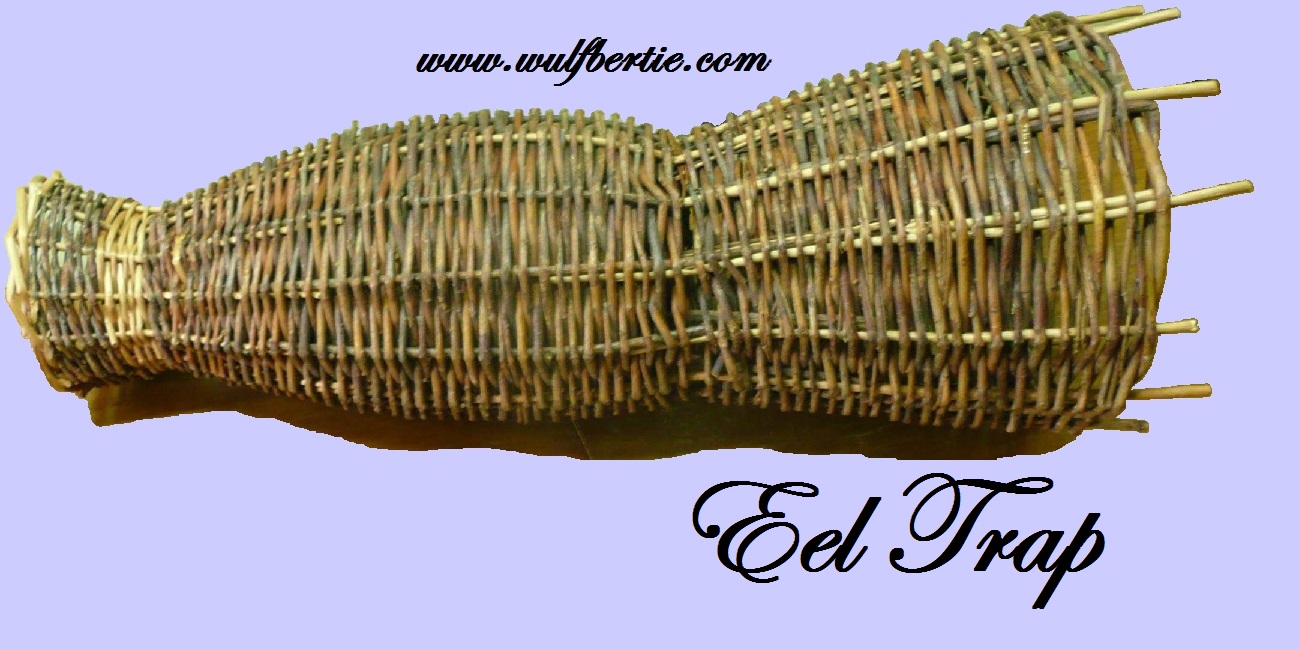
- Young eels, which migrate up the Severn (Sseverne) in the spring.
- People would often trap them in eel traps or fished them out of the river using big nets
when they were sitting in a coracle.
-
Emetic
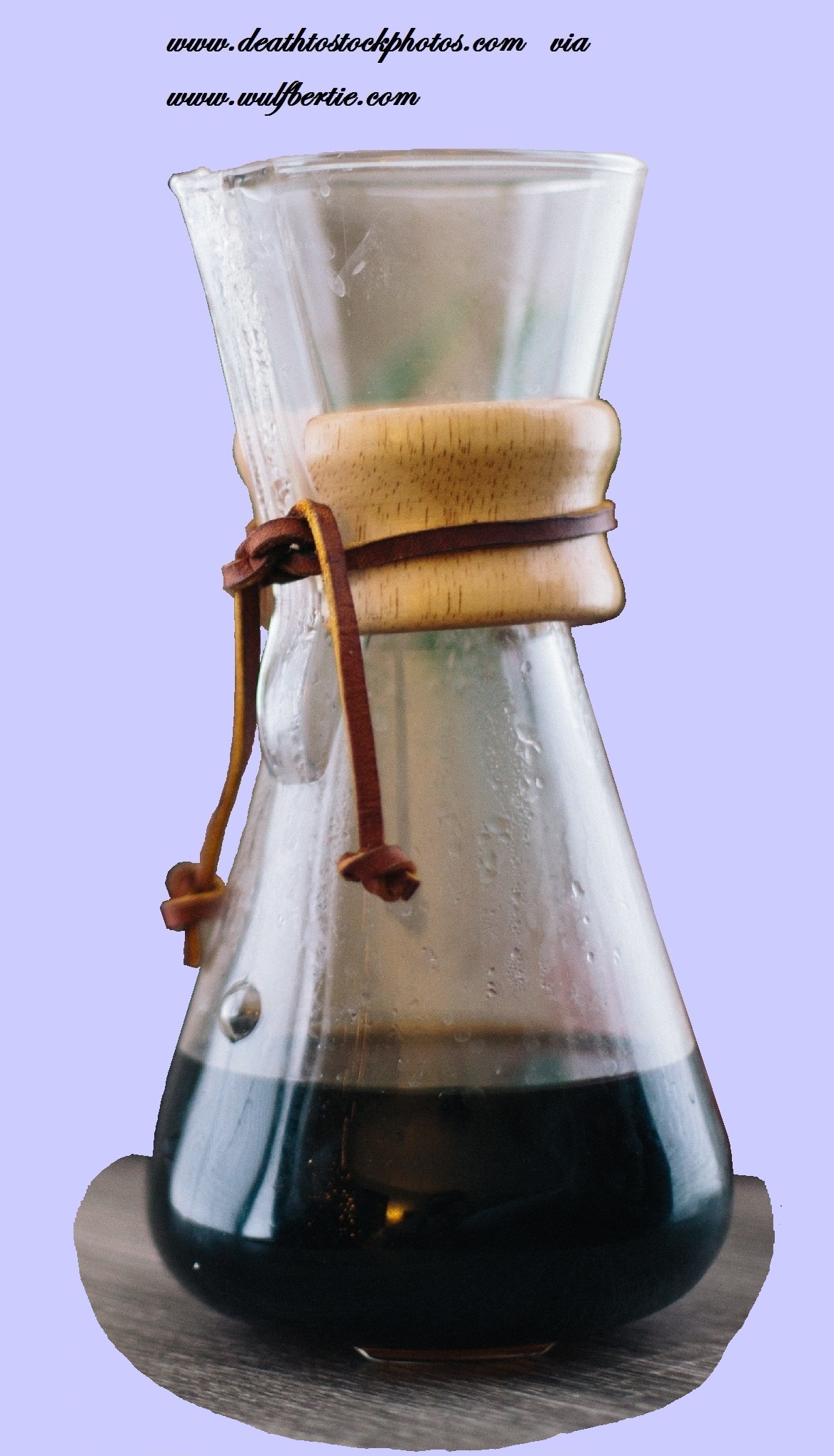
- A medicine that makes you throw up to rid your body of a poison amongst all the vomit.
-
Encyclopaedia
- A long word for a long book which used to exist before the invention of wikipedia.
- It contained all the things which anyone knew and could be bothered to write down.
It was very heavy.
- Encyclopaedic means so close to being complete that it doesn't matter any more.
-
Equine
- A posh Latin word for horse. It is not clear why the
Romans (who spoke latin) couldn't just say "horse" like everyone else.
-
Ether
- Or 'Aether'. Either the clear air or a substance in outer space.
- Ethereal things are hard to get a grip of. Go on - try grabbing the air. Can't do it eh?
-
Expectations
- Things which you expect. A person with expectations may expect to be promoted to
great things, such as being an Abbot. People with expectations can be annoying to those
without.
- Expectations is quite a long word and Wulfbertie sometimes gets it confused.
-
Extreme Unction
- The very, very best unction.
- The final blessing of a person who is dying, to give them comfort as they go to
heaven. Wulfbertie confuses this concept with something called Serene Punction (which we have
never heard of).
-
Exorcism
- A ceremony to expel evil spirits.
Top
 F
F
-
'Farmery
- See Infirmary.
-
Famine
- Nothing to eat. Not even turnips. Like an enforced
Fast.
-
Fast
- Swift. In the Wulf Man Mantra, Wulf Men are hand fast which
means they have fast hands to disarm their opponents, steal secrets from the enemy and do
other noble things.
- Alternatively a Fast is when you are not allowed to eat for a period of
time. Like a diet but more spiritual. If you have been fasting you may not be very fast.
-
Fatal
- Sure to cause you to die. In Wulfbertie's time it meant the same as terminal
because they didn't have airports yet.
-
Felucca
- A graceful sailing boat with a large sail, commonly found in Egypt.
-
Fjord
- A word written in such an odd way that it could be Welsh. But actually it isn't.
It is Norse - i.e. Viking.
- It means a very sheltered rocky bay in the coast (sometimes between
peninsulas) of a type which they only really have in Norway.
-
Forge
- The blacksmith's furnace for melting metal.
- Create a fake. Not necessarily out of metal. Often dishonest people would
forge deeds and other documents.
-
Forefather
- A member of your family who came before you in a direct line. Like your
grandparents, and their parents, and their parents and their parents an so
on.
- An ancestor.
- Wulfbertie does not really understand why there are four fathers, because
he only has one. His father (Wulfbeard) appears
on his family tree.
-
Fossil
- The remains of an ancient creature which has been
preserved in the ground and turned into stone.
-
Fox & Geese
- A board game, along with Nine Men's Morris, played in
the monastery.
Top
 G
G
-
Garth
- Open space in the centre of the cloisters.
- A man or boy with the sort of name which is appropriate for a US country singer.
-
Gems and Jewels
- Rocks of such rarity and glittery-ness that they are very very valuable.
Even more valuable than gold or candy-floss. People sometimes learn
Geology in order to find them.
-
Geology
- Rocks and the study of rocks. Yes - people do study rocks.
Amanita knows a lot about rocks and it has
been very useful to her.
-
Guarding one's Lions
- 'Girding one's Loins' (also called 'kilting'). Wulfbertie may have confused
different spellings and different stories.
-
Grenade
- A ball of explosive powder.
-
Groat
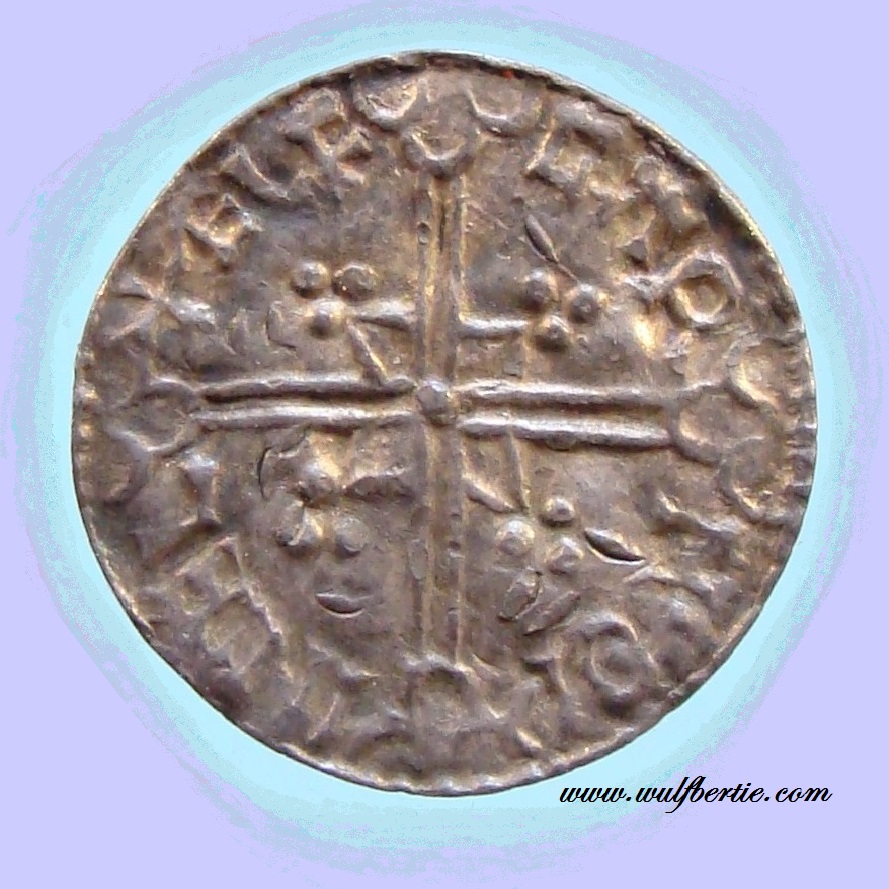
- A coin, like a sceata or a penny. Less than a Mark.
-
Glevum, Glewcester, Glewchester,"the best city in the world", Glewcaster,
Glewster, Caer Glui
- Old names for the English city now known as Gloucester.
Top
 H
H
-
Habit
- A monk's woolly gown.
- Doing something without thinking. The something is usually bad.
-
Harpsichord
- A musical instrument which is a bit like an old fashioned piano. It makes
a plunky-plunk sort of note.
-
Hearthstone
- A large flat stone on which you can build a fire.
-
Hexagon
-
 A shape with six sides. Three more than a Triangle, Two more than a
Square, one more than a Pentagon and one less than a Heptagon.
A shape with six sides. Three more than a Triangle, Two more than a
Square, one more than a Pentagon and one less than a Heptagon.
- Nature is fond of hexagons. Bees use them for their honeycombs. Snowflakes
like to be shaped like them. Giants use them for their causeways.
-
Heir
- The person who should inherit something after the current owner's
death. Often a family member or someone appointed by a last will and
testament.
- In this way a lot of looms were passed down through families for generations.
Heir-looms are not so common these days.
-
Henchman
- An assistant, sidekick or
lieutenant to do your dirty work. Always a bad guy.
Some Henchmen have hunches.
-
Hibernia
- An old name for the island now called Ireland. At the time, it was full of
hibernians. Hibernians now call themselves Irish.
-
Hinterland
- The bit of land around a bit of land of which the hinterland is a hinterland.
-
Hue and Cry
- When the alarm is shouted. All men must chase after the criminal and put him
in the stocks.
Top
 I
I
-
Ides
- A Roman term for the middle of the month. Sometimes important and sinister
things happened on the Ides of a month.
-
Infirmary
...or 'farmery'.
- A place for care of the sick. Potions and leeches
abound here.
-
Iowa Blue
- A breed of chicken.
Sub-Prior Riggor does not like the Rhode Island Red breed.
-
Intrigue
- Plotting, politics, rebellion and secrets. Sometimes it is so interesting that
it will attract your curiosity.
Top
 J
J
-
Jam
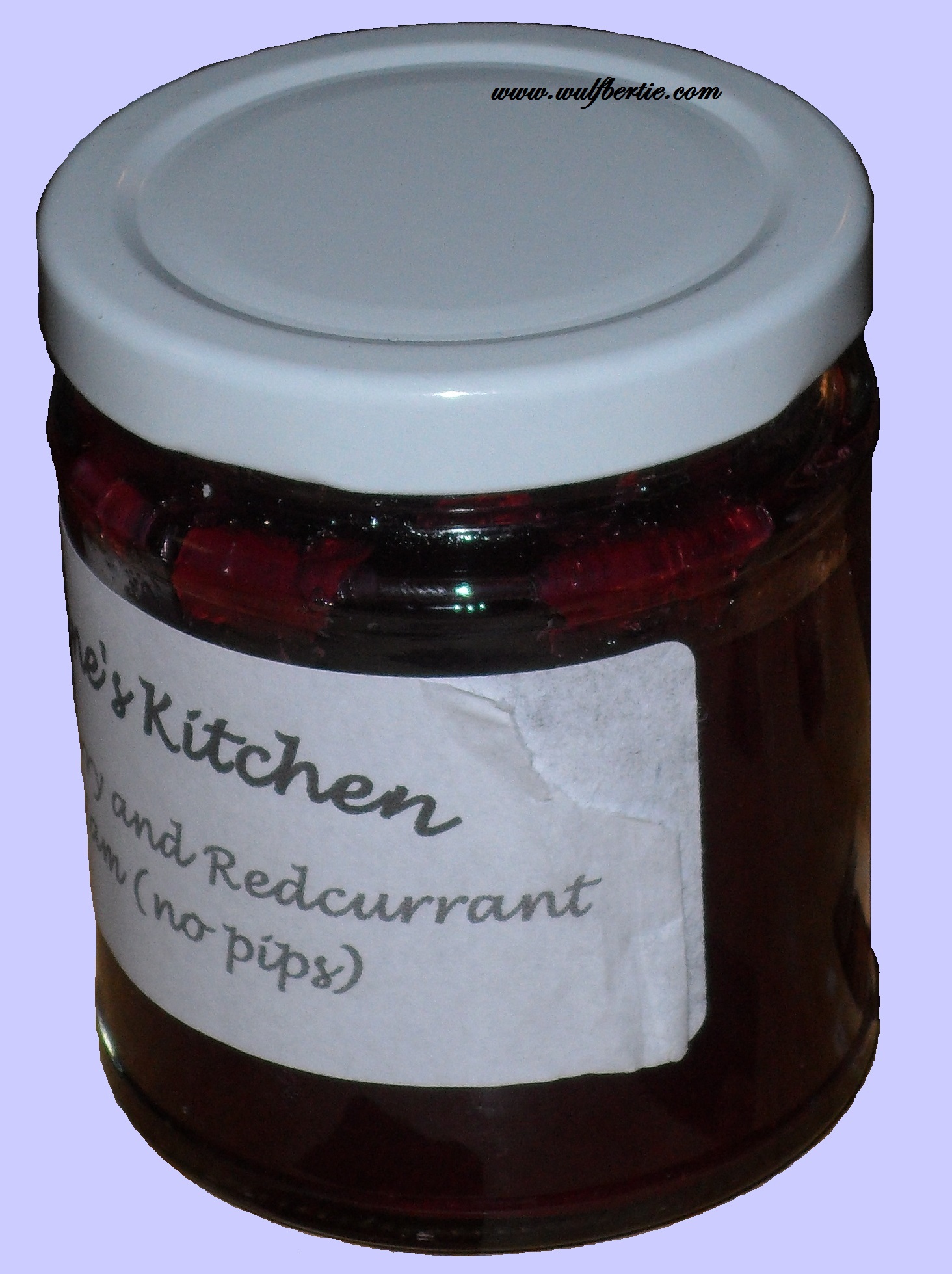
- A sweet fruity preserve or a sticky mess.
- A tight situation which may also be a sticky mess.
- Or perhaps a clog
- Can be the cause of many problems and arguments.
Top
 K
K
-
Khan
- A Mongol King.
-
Kitchener
- Person in charge of the kitchen.
- Often tastes the dishes to make sure they are good. Is often fat.
-
Kniaz
- A Russian Duke.
Top
 L
L
-
Latin
- A very difficult ancient language. Nobody speaks it any more
because it is too difficult, except for the Pope who has to concentrate.
- Because no-one speaks it, it is called a dead language. Other dead
languages include Norse (which the Vikings spoke),
Hieroglyphs (which ancient Egyptians carved into the Pyramids) and
Sanskrit which was writ in Sand.
- The only people who were clever enough to speak Latin were the
Romans.
- Eventually it turned out to be too hard even for the Romans as explained by this
poem, which was written by a schoolchild who was forced to learn Latin:
- "Latin's a dead language,
- as dead as can be -
- it killed off the Romans
- and now it's killing me."
-
Latrine
- Toilets - often temporary ones (like poo-pits) dug in a trench. More permanent
latrines might be found in the Necessarium.
-
Lavatorium
- A room for washing and the occasional bath.
-
Legion
- A division of Roman soldiers.
- An ancient word for "many".
-
Lemur
- A small rat-like animal from Africa with very big eyes. Specially trained ones
are good at pulling sleds.
-
Leper
- A person suffering from leperosy. Leperosy is now curable. In Wulfbertie's time,
however, it caused sores, pustules
and the loss of fingers, eyes, toes and ears.
- In the end it was fatal.
- For these reasons people were very scared of catching Leperosy and would avoid Lepers.
In order to know where they were, the people made Lepers wear bells around their necks,
which wasn't very tolerant.
-
Lent
- A time of fasting before Easter. Starts after pancake day.
-
Librarium
- Clean hands required to read books. (Or
scrolls).
-
Lieutenant
- Main assistant and chief sidekick.
- Said Left-tenant because they stand on the left side where you can kick them.
- An officer in the army.
- Sometimes a placeholder.
-
Lintel
- The top of a doorway.
-
Lisp
- A difficulty with speaking which makes saying an 's' sound a bit like
saying 'th'. Gwynef has a lisp (or a lithp)
because she hath lotht her front teeth.
-
Livery
- A boarding stable for horses.
- Like liver - which is a sort of offal.
-
Logic
- The idea that you can make something happen by pointing out that it must be true.
Top
 M
M
-
Magister
- Teacher. More Magist.
-
Mantra
- An inspirational saying or rhyme.
-
Manuscript
- A document which has been written by hand. That is, it has been scripted manually.
- Possibly in a Scriptorium before being kept in
a Librarium.
- Deeds are often manuscripts.
-
Mark
- A dirty blot or blob which has to be cleaned away by scrubbing.
- A signature, scratch, paint-stroke or inky symbol.
- A measure of money. Lots of money. Much more than
a groat,
a thrymsa,
sceata or sestersius.
- A man named "Mark".
-
Martyr
- Someone who dies for his or her faith. Sometimes saints
were martyrs and sometimes martyrs were made into saints by being
canonized.
-
Master Mason
- Person in charge of a building site.
-
Medicus
- A monk trained in herbal medicine.
-
Mercenary
- Only interested in money.
- A person hired to fight for someone else because they will pay. Tend to be unreliable
soldiers as they will only stick around if they are sure to be paid.
-
Mercia
- An Anglo-Saxon kingdom, in the middle of modern England. The bit of Mercia around
Glewcaster included the ancient kingdom of Hwicca.
-
Mere
- A pond.
- Or marshy ground on its way to being a pond.
-
Midden
- Rubbish heap.
-
Middle Ages
- A time in the middle of history, when there had been plenty of history before and there
was still lots to come. Some parts of the Middle Ages were quite dark - these are known as the
Dark Ages and were mostly near the start of the Middle Ages
- People have middle ages too. Sometimes before people have their middle age they also
have a dark age, which they tend not to tell you about.
-
Middle East
- A bit of the East between the far east and the near east, below the north-east and
above the south-east.
- Places in the Middle East include: the Persian Gulf, the Arabian
Peninsula, Jerusalem, Oman and
Essex.
-
Miracle
- A wonderous and inexplicable event which has needed some input from God (or possibly
a saint).
-
Miskin
- Manure heap. Muck from the stables was deposited there.
-
Monastery
- A place where monks lived and where plenty of monastic things
happen.
-
Monk
.jpg)
- A man who has dedicated his life to good works and prayer
and has decided to live in a Monastery to do so.
- Male equivalent of the Nun.
- Usually have very bad haircuts - shaggy on the outside, bald in the middle.
-
Moor
- Uncultivated ground.
- Bad spelling for something added to nun.
- A warrior from Africa or Spain with a curvy scimitar and a liking for geometrical
patterns. Sometimes Moors were Arabs.
-
Mongolia
- A country in Asia which is miles from anywhere except other places in Mongolia. Outer
Mongolia is a bit of Mongolia which is miles from anywhere including other places in Mongolia
-
Mush
- Squashed or mashed smush.
- A word used to tell animals pulling a sled to start pulling.
-
Mystical
- Being tickled by a girl.
- Weird and ethereal. Sometimes it might be magical or maybe just no-one
can explain it.
- It might be like being holy if miracles are involved.
Top
 N
N
-
Nain
- Welsh for Grandmother (sounds like 'nine').
-
Necessarium
- An out-house (for human deposits).
-
Novice
- A monk with no faults?
- One on probation before taking his final vows.
- Next stage up from being an Oblate... or
Postulant.
- Probably has fewer pustules than both.
-
Nostrum
- An unproven remedy or medicine.
-
Numbral
- The thing which was there before a number.
-
Nun
- Not many at all.
- Or the female alternative to a monk.
- Often get into jams
- Not to be confused with Nain.
Especially if there are nine of them.
-
Nunnery
- Like nothing much at all.
- Or the place where nuns live.
Top
 O
O
-
Oblate
- Same as a Postulant.
- Pustules are not obligatory.
-
Offal
- Bits of meat coming from the yukkier bits of animals
like kidneys, intestine and liver.
- Bad spelling of being really bad.
-
Omen
- A sign which predicts mystical or holy
events to come (such as a miracle. Also known as a Portent or sometimes a Harbinger.
- Not to be confused with Amen which is the end of a prayer or Oman which
is an Arab country.
-
Ostler
- A groom, who works in the horse stables (with apologies to Alfred Noyes, who wrote
the poem: the Highwayman in which Tom the Ostler makes his first appearance)
Top
 P
P
-
Pallet
- A Mattress.
- Or perhaps, the bit of wood on which artists mix their coloured paints.
- Could be a small Pal. Like Ralf, for instance.
-
Parsnips & Turnips
- Yes, they had to eat their vegetables too.
-
Peninsula
- A sticky-out bit of the seaside which is surrounded on three sides by the sea
but isn't quite an island because it is still clinging to the mainland on the other side.
- In Latin, Insula means "Island" and Pen means "almost." So
peninsula is almost an island.
- But in Celtic, Pen means "head." So Peninsula
would be the head of the Island - which sort of works.
- And in English Pen means... well, a pen. So Peninsula would be a pen-shaped
island - which are rare.
- It does mean that pen-pen could be the head of a pen (nib); or almost a
pen (pencil) or almost-a-head (level or "head-to-head" - which would also be pen-pen).
Which is all very satisfactory.
-
Perch
- Like a Rod, a measure of distance.
- A small high place on which a bird, a girl or a boy might sit or stand to get
a good view of things.
- A type of edible fish. When left for too long before cooking, it might get smelly
and become putrid.
-
Pewter
- A mixture of tin and another metal, which can look shiny like silver.
-
Pig-swill
- Leftovers and vegetable peelings mixed up to feed pigs.
-
Pilgrimage
- A journey to a holy or religious site for the purposes of contemplation or
self-improvement. Pilgrims would also want to benefit from the blessings of the
site.
-
Plight
- Terrible disaster or condition.
- What you do to a Troth when you get married.
-
Porter
- Gate-keeper.
- Don't ask one to carry anything.
- Could be a very dark sort of beer which was full of vitamins
and iron and probably loads of other things too.
-
Posterity
- A very impressive sort of history. The sort of history which people take seriously.
- The bit at your posterior. Your posterior may be a Bot.
But not an Abbot.
-
Postulant
- Candidate for admission to the monastery.
- May or may not have pustules.
- Also known as an Oblate.
- May be promoted to become a Novice.
-
Pottage
- Soup, stew. Usually a mess of.
-
Prayers
- Monks prayed several times a day, starting in the middle of the night.
- Each set of prayers had a different name. The prayers set out in the Rule
included:
- Compline- during the night
- Matins- at start of day
- Lauds- morning
- Terce - mid-morning
- Sext - Midday
- None - mid-afternoon
- Vespers- evening
- Compline- start over again.
-
Prior
- Deputy to Abbot, despite having got there first.
- (subPriorsare not quite Priors and may feel bitter about it).
-
Progress
- A royal tour.
- How things get better.
-
Putrid
- Rotten, smelly, slimy and generally disgusting. Pustules might
become putrid.
-
Pustule
- A spot, sore, boil, hive, blackhead, ulcer, carbuncle, pimple, welt,
abscess (Not Abbess), blister, blain, infection, canker
or furuncle.
-
Pyramid
- A pointy building with a square base and flat triangular sides.
- The ancient Egyptians made a speciality of them. They liked to bury their kings
underneath.
- Some of the Egyptian kings were very good-o. Some were terrible-o. Most were just fair-o.
Top
 Q
Q
- Quarantine
- Isolation, to prevent the spread of infection such as the Bloody Flux
or Rabies.
Top
 R
R
-
Rabies
- A spit to drip down your chin.
- Also known as Hydrophobia (which is ancient greek for "Fear of Water") because sufferers
will not go near water. Wulfbertie pretended to have hydrophobia to get out of having cold baths. It didn't work.
-
Raider
- Not necessarily a Viking. Could be a marauder or bandit, or
a hired assassin.
-
Ransom
- Money paid to release a kidnapped person.
- Rattling Chest
- Bronchitis, pleurisy or some other bad coughing disease.
-
Ravenous
- Very very hungry.
- A bit like a Raven (which is a bigger version of a crow).
-
Relic
- Part of a holy person's body or belongings kept as an object of reverence.
-
Reinforcements
- More soldiers sent to support the army.
- A repeat of inforcements.
-
Resourseful
- Imaginative and full of good ideas. Able to come up with a plan to get out of a
tight jam.
-
Roundhouse
- A round house. Saxons liked to make their houses
round with a pointy thatched roof. Sometimes the farm animals would
live inside with the family to help keep the house warm.
-
R-Senk
- A mis-hearing of 'Arsenic' which is a very deadly poison. Almost as poisonous
as Amanita mushrooms.
- Ruin
- Wreck, remains, destruction and collapse.
- Rule
- The Rule of St Benedict. A set of rules governing how
the Monks had to behave in the monastery.
Top
 S
S
-
Saint
- A holy person who has been recognised by the church and canonized
at a ceremony.
-
Sanctuary
- The most important part of the church around the altar.
- People (including damsels) in distress and criminals looking for forgiveness would often seek it.
-
Sawmill
- A place for cutting up trees to form logs and planks.
- Sometimes the men would use big saws to cut up the wood. Other times a big wheel with a
blade on it was turned using the wind or a water-wheel.
-
Scriptorium
- A room for writing or copying manuscripts.
-
Scree
- Loose stones on a hillside. You scree-m when you slide on them.
-
Scroll
- A roll of paper or parchment on which deeds, manuscripts and other
important letters were written.
-
Scrub
- How to remove dirty marks, dirty stains and dirt.
- What happens to you in a bathtub if you don't have the good sense to avoid being there in
the first place.
- Bits of messy land covered in straggly plants and thorny bushes.
-
Seam
- The bit where the cloth in your clothes overlaps and forms a lumpy bit.
- A section of the ground where there is a particular type of rock. Often the rock might
contain Gems and Jewels, coal or fossils.
-
Serf
- A peasant worker on a country estate. Serfs were 'bonded labourers' which meant that they had
to work for the owner of the estate and couldn't leave - a bit like a slave.
-
Severn
- Sometimes (but only really by Froody) written "Sseverne." The river which flows through Glewcaster.
Known by the Romans as Sabrina.
- Despite being called the Severn, there is only one. In the hills above the Severn are the seven
springs. Annoyingly they are not the seven springs of the Severn but are the source of the Thames
(which is another river but flows the wrong way)
- The tide comes a long way up the Severn which is a bore. In spring there are lots
of elvers. The rest of the time there may be perch and
townspeople crossing in coracles. In the middle is the Island of Alney and
some ducks.
-
Shahenshah
- Shah is a word for king in India. A Shahenshah is a shah of shahs or a king of kings. Very
powerful and important person.
-
Sheriff
- The public official appointed to keep peace in a town and to enforce the law. The person in
charge of the local guards.
-
Shrine
- An altar or small building in a holy place for pilgrims to use for
their prayers.
-
Sidekick
- A henchman, or possibly a bodyguard.
-
Sling
- A device for flinging objects.
- Smaller than a catapult
- Also nothing to do with cats.
-
Slype
- A passage or corridor.
- (A Dark Slype is a dark slype).
-
Spit
- A long metal spike for skewering chunks of meat and cooking them over a fire.
- You know what spitting is. No need to demonstrate.
-
Spring
- To leap into the air as if you were abounding
- A coil of metal which bounces, stretches and returns to the shape it started with (the coiled one).
- a place where fresh water leaps into the air from the ground and starts its own little stream or river.
-
St Arilda of Oldbury
- A young girl who was martyred and canonized after
being slain by a nasty man named Municus. Another of the unofficial patroness Saints of Gloucester.
-
St Benedict
- Founder of the Benedictine order who wrote the Rule of St Benedict. The
Monks at Glewcaster followed the Rule. They were known as the Black Monks because they wore
black habits, not because they had them.
- St Benedict was immune to poison (such as R-Senk and
Amanita), had a sister called Scholastica and is the patron
saint of Europe and of Students.
-
St Kyneburg
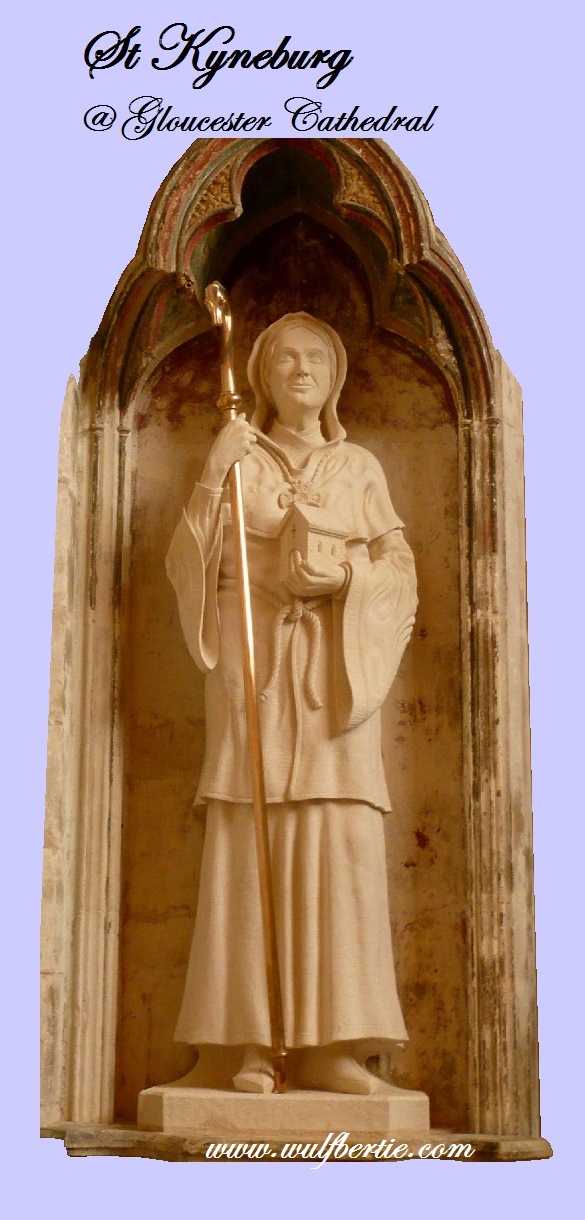
- A saint with a history lost in the shadows of time and a name which is difficult to say. She may have
been a young girl from Gloucester or the daughter of a pagan king of Mercia. Or both.
She was definitely an Abbess - unless she wasn't.
- She was probably thrown down a well by a local baker or his wife.
This may of may not have had something to do with a disagreement about jam.
Rather unsympathetically, the people of Gloucester named the well after her. Kyneburg, meanwhile,
was canonized and is an unofficial patroness saint of Gloucester.
- Wulfbertie may know more because her brother was called Wulfhere and could have been one
of his distant Four Fathers.
-
St Petronella
- An early Christian martyr, sometimes confused with such non-existent saints
as: Petroleum, Petroglyph, Petrograd, Protectus and Sallyport.
-
Starboard
- The right-hand side of a boat if you are looking in the direction the boat is going. The
opposite is called 'Port.' Which doesn't seem very helpful if you are in a harbour at night and the
port is to starboard but the stars are to port. Starboard is generally coloured in green for some
reason.
- A board covered in stars.
-
Stews
- Monastery fishponds. A mini-Mere
stocked with fish.
- A number of pottages.
-
Stocks

- A criminal (who had not successfully found Sanctuary) sat
with his or her hands and feet trapped between wooden bars, to take stock of his or her misdeeds.
-
SubRegulus
- Viceroy.
- A person who rules a district for an overlord.
- Baldrat is a viceroy for King Alfred.
Top
 T
T
- Tack Box
- A place to keep horse leather and materials, and short nails?
- Bad spelling of a tuck-box
-
Tessera
- A small piece of a Roman mosaic. Usually made of coloured pottery or glass.
-
Thatch
- Roofing material made of packed grasses or reeds.
-
Thrymsa
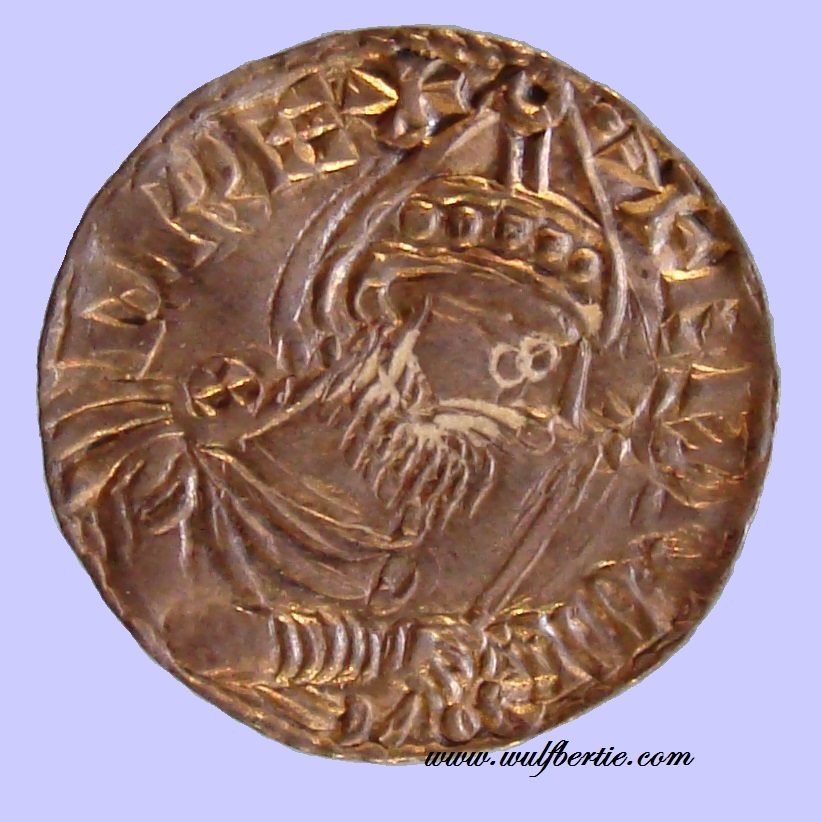
- Like a sceata, a unit of Saxon coinage. Similar to a Roman sestersius. Or a groat.
Or a penny. Much less than a Mark.
-
Travail
- Hard work or labour
- Troubles.
-
Treachery
- Dishonesty, intrigue and plotting. Being secret for a bad purpose.
-
Treaty
- A formal signed agreement to be friends. Usually signed between countries or kings to bring
a war or battle to an end. A very important Deed.
-
Trencher
- The hard crust of a loaf used as a plate.
-
Triskel
- A Celtic design of three spirals.
-
Trug
- A basket.
-
Tuffet
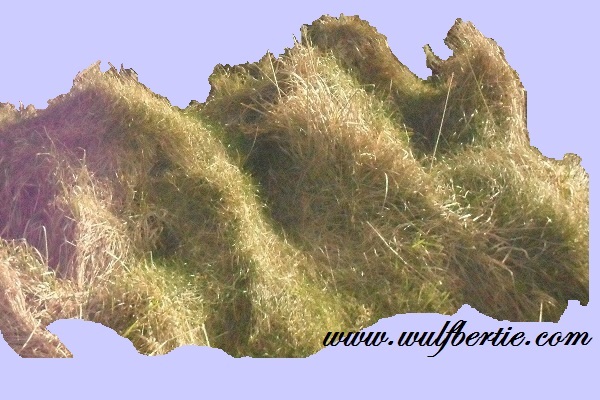
- A clod or stool to sit upon, particularly while eating curds and whey (or sulking).
-
Turf
- Clumps of soil and grass.
- To dislodge someone and throw them out.
-
Tywysog
- Welsh for prince.
Top
 U
U
-
Uncle
- The brother of your father or your mother's brother.
- Or the husband of your aunt.
- Or the Brother of a Brother, where the Brother (the first one) is getting
old.
-
Undercroft
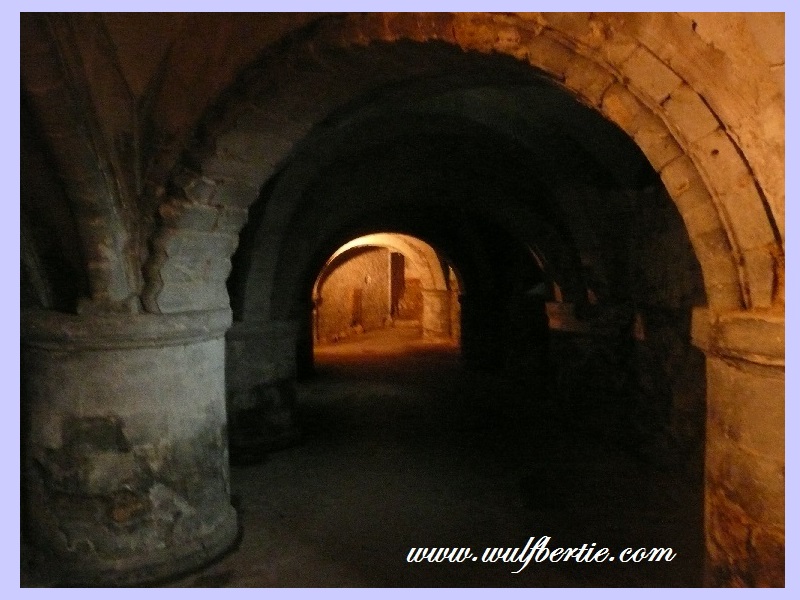
- A room, vault or space under a building. Like a Crypt.
-
Usurper
- Someone who steals the crown from the rightful heir.
Top
 V
V
-
Vengence
- Getting your own back in a big way.
- Successful revenge.
-
Viking

- Norsemen who came in longships to raid, burn and steal things from the locals. Their boats
were very good and they were good sailors so they got further than anyone else. They had their
own gods led by Tyr, Wodin, Thor and Frigg after whom Tuesday, Wednesday, Thursday and Friday are named.
-
Vocation
- A feeling that one should do a certain job.
Top
 W
W
-
Wessex
- A Saxon kingdom in the South and West of England. Its capital is Wincaster (Winchester).
- It is named after the "West Saxons" who founded it.
- Wessex was ruled by King Alfred. He was the top king amongst
the Saxons. The King of Mercia was his junior.
Alfred defeated the Danes and was very proud of it.
-
Woad
- A cross between wood and a toad.
- A plant used for the creation of blue dye used to dye things blue. Sometimes the things were
people who ended up looking blue. This was quite a Celtic thing to do.
-
Wulf
- A common name in Anglo-Saxon times.
-
Wyvern
- A scary, fire breathing creature with wings and two legs - like a
dragon. A symbol of a Welsh prince
(Tywysog).
Top
 X
X
-
X
- Ten, in Roman Numbrals
- In mathematics it is an unknown quantity.
- Sometimes a useful alternative to having a signature.
Top
 Y
Y
Top
 Z
Z
Top
 Gloss-er-ary
Gloss-er-ary

 Gloss-er-ary
Gloss-er-ary
 A
A
 B
B
 C
C
 D
D E
E
 F
F
 G
G

 H
H
 A shape with six sides. Three more than a Triangle, Two more than a
Square, one more than a Pentagon and one less than a Heptagon.
A shape with six sides. Three more than a Triangle, Two more than a
Square, one more than a Pentagon and one less than a Heptagon.
 I
I
 J
J

 K
K
 L
L
 M
M
.jpg)
 N
N
 O
O
 P
P
 Q
Q
 R
R
 S
S

 T
T

 U
U
 V
V

 W
W
 X
X
 Y
Y
 Z
Z
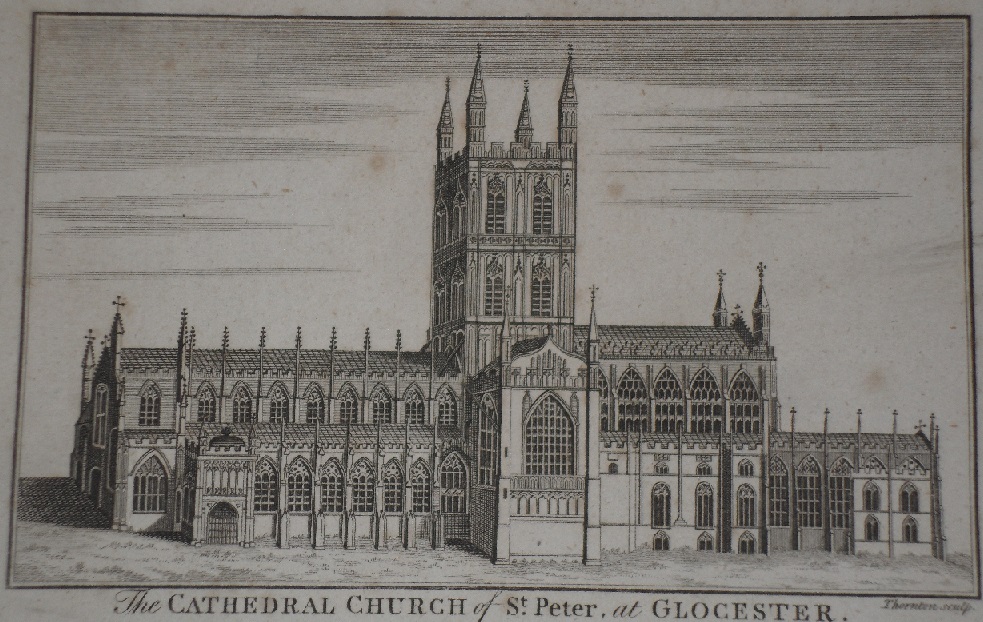
 The Brothers, Uncles, Beogren and other adults like to read clever stories at
Tilebury
The Brothers, Uncles, Beogren and other adults like to read clever stories at
Tilebury